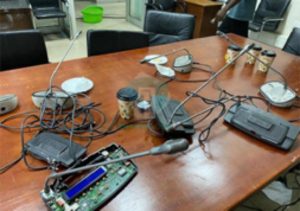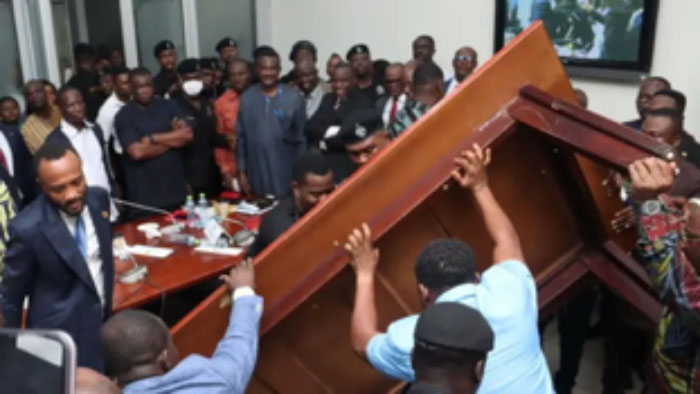A Chaotic scene during the vetting process
Ghana’s Parliament has undergone a dramatic transformation. Once defined by balance and brinkmanship, it now appears to be sliding into a state of unchecked dominance. The 2024 general election delivered a political landslide for the National Democratic Congress (NDC), shifting the legislative terrain from a precarious 137-137 split to a commanding 183-seat majority—plus four allied independent Members of Parliament (MPs). That leaves the New Patriotic Party (NPP) with a diminished presence of just 88 seats.
The numbers tell a story of overwhelming advantage, but beneath them lies a deeper concern: Is Ghana’s Parliament becoming a chamber of executive convenience rather than oversight? Speaker Alban Sumana Kingsford Bagbin’s branding of the opposition as a “micro minority” has intensified that concern. And events since January suggest Parliament may be at a tipping point.
A Majority In Overdrive
The signs of imbalance surfaced early in the new parliamentary term. On January 30, 2025, the Appointments Committee’s vetting of ministerial nominees descended into chaos. Originally, both caucuses agreed to vet three individuals, later adjusting to four. However, after completing the fourth vetting, the NDC Majority introduced two additional nominees—without prior consensus.
The Minority, led by Alexander Afenyo-Markin, protested vociferously. “We agreed to vet four nominees, not six,” he declared, accusing the Majority of acting in bad faith. Tensions boiled over. Tables and microphones were overturned, and the police had to intervene to restore calm.
Four MPs were suspended afterward, including both Chief Whips—Rockson-Nelson Dafeamekpor for the Majority and Frank Annoh-Dompreh for the Minority. Yet the Majority carried on with the vetting process the next day, in the Minority’s absence, triggering fears that parliamentary deliberation had been replaced with political railroading.
Controlling the Conversation
The perception of parliamentary overreach deepened during the 2025 Budget and Economic Policy discussions. In a heated session that the Majority insisted be described as a “comment” rather than a “debate,” Majority Leader Mahama Ayariga proposed a novel idea: allocate speaking time according to the numerical strength of each caucus.
The proposal was met with fierce opposition. “What is going on in this chamber?” shouted Afenyo-Markin, as First Deputy Speaker Bernard Ahiafor agreed to the suggestion. It took Speaker Bagbin’s intervention to restore calm. In rejecting the proposal, Mr. Bagbin referenced tradition: “The Minority will have their say, and the Majority will have their way. That has been the practice since the inception of the Fourth Republic.”
Even in his defence of parliamentary norms, Mr. Bagbin acknowledged the power imbalance that now defines Ghana’s legislative process.
Midnight Laws, Morning Aftershocks
The Majority’s dominance has also manifested in legislative timing. In the early hours of March 29, 2025, Parliament passed the controversial Ghana GoldBold Bill at 3:10 a.m. The Minority had requested a deferral until 10 a.m. to allow for further deliberation. That request was denied, prompting a walkout.
Afterward, Minority Leader Afenyo-Markin accused the government of prioritizing illegal mining interests—galamsey—over responsible governance. “They are now the Apostles promoting galamsey,” he said. The incident marked yet another moment where legislative power appeared to outweigh parliamentary principle.
Boycotts And Budgeting Woes
The Majority’s assertiveness has not only caused friction during law-making but also in Parliament’s day-to-day functioning. On March 2, 2025, the Minority boycotted a three-day orientation programme in Ho, Volta Region, on grounds of cost.
Frank Annoh-Dompreh, the Minority Chief Whip, argued the orientation could have been held in the chamber to avoid unnecessary spending—aligning with President John Mahama’s call for fiscal restraint. Speaker Bagbin, however, criticized the boycott as “unacceptable” and counterproductive.
It wasn’t the first time such concerns were raised. In the previous Parliament, the NDC Minority objected to a similar programme at the Rock City Hotel in Koforidua. Now in opposition, the NPP was raising the same flags—suggesting that partisanship may shift, but parliamentary culture does not.

The destroyed microphones
A Chamber At A Crossroads
These developments raise a critical question: Is Ghana’s Parliament still a space for bipartisan dialogue and checks and balances, or is it becoming a rubber stamp for executive authority?
While numerical strength gives the NDC the power to legislate at will, democracy demands more than majorities. It requires deliberation, dissent, and the legitimacy that comes from inclusive governance. As Speaker Bagbin often reminds the chamber, “Consensus is not weakness—it is democracy in practice.”
With a weakened opposition and a steamrolling Majority, Parliament must now confront its greatest test: whether it can still act as the conscience of the nation, or if it will be reduced to a choir singing to the tune of the executive.
In Ghana’s new Parliament, the Majority clearly has its way. But the question remains: will the Minority still have its say—and will anyone be listening?
By Ernest Kofi Adu, Parliamentary Correspondent


